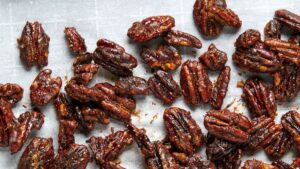Introduction:
We’ve all been raised with the belief that refrigerating food is the golden rule to keep it fresh and safe. While this holds true for many items, there are certain foods that should never find their way into the chilly confines of your refrigerator. In fact, refrigeration can negatively impact their flavor, texture, and overall quality. Join us on a culinary journey as we explore the top 10 foods you should never refrigerate.
- Tomatoes:
Tomatoes are a kitchen staple, but they’re also highly sensitive to cold temperatures. Refrigerating tomatoes can alter their texture, making them mealy and tasteless. Instead, store them at room temperature, away from direct sunlight, to preserve their juicy and flavorful profile.
- Potatoes:
Refrigerating potatoes might seem like a good idea to extend their shelf life, but it’s actually counterproductive. The cold environment converts the starches in potatoes into sugars, resulting in an undesirable sweet taste and a gritty texture. Keep potatoes in a cool, dark place, but not in the fridge.
- Onions:
Onions thrive in a dry, well-ventilated environment. Refrigerating them can turn their texture rubbery and cause them to impart their odor to neighboring foods. Store onions in a cool, dry place with good air circulation, and keep them away from potatoes to prevent premature sprouting.
- Avocados:
The creamy goodness of avocados is best enjoyed when they are perfectly ripe. Storing avocados in the refrigerator can slow down the ripening process and affect their flavor and texture. Keep unripe avocados on the counter until they are ready to eat, and then transfer them to the refrigerator if needed.
- Honey:
Honey is a natural preservative and does not require refrigeration. In fact, chilling honey can cause it to crystallize, affecting its texture and making it difficult to use. Store honey in a cool, dry place, and it will remain in its liquid golden state.
- Bread:
While some may argue that refrigerating bread can prevent mold growth, it also accelerates the staling process. Bread tends to dry out faster in the cold, resulting in a less-than-ideal texture. Keep bread in a breadbox or a cool, dark cupboard to maintain its freshness.
- Olive Oil:
Olive oil solidifies in the refrigerator, turning into a thick, cloudy consistency. This doesn’t mean it has gone bad, but the change in texture is far from appetizing. Store olive oil in a cool, dark place to maintain its smooth liquid form and preserve its rich flavor.
- Coffee:
Coffee beans and grounds absorb odors and moisture, which can degrade their flavor. Storing coffee in the refrigerator can lead to the loss of its aromatic oils and robust taste. Keep coffee in an airtight container in a cool, dark cupboard to ensure a fresh and flavorful brew.
- Melons:
Melons, such as watermelon and cantaloupe, lose their flavor and texture when exposed to cold temperatures. Refrigeration can also diminish the levels of antioxidants present in these fruits. Keep melons at room temperature until they’re cut, and then store the cut pieces in the refrigerator.
- Garlic:
Refrigerating garlic can cause it to sprout and become rubbery. Instead, store garlic bulbs in a cool, dry place with good air circulation. Once cloves are separated, they can be stored in a cool, dark place or used within a week.
Conclusion:
Understanding which foods are best kept out of the refrigerator can significantly enhance your culinary experience. By preserving the natural flavors and textures of these items, you’ll be able to savor the full richness of your favorite ingredients. Embrace these storage tips, and your taste buds will thank you for it!



